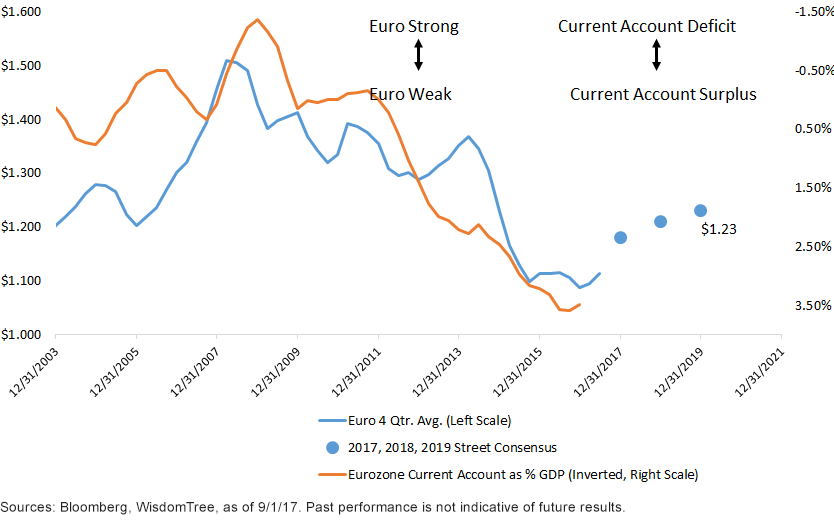Macron or Draghi? Why We Stick with the Italian Stallion


It’s been just a few months since Emmanuel Macron took the French presidency, yet already the punditry is hailing a new era of euro strength and economic vibrancy amid a story of long-awaited systemic reform. With the success that his party, En Marche, recently found in parliamentary elections, those cries have gotten louder (even if Macron’s approval ratings have gone quieter).
Like most modern politicians, Macron has a large (€50 billion) infrastructure plan in his pocket, a tax cutting vision and designs on labor market reforms—along with a governing majority that can push through many of these changes. Stronger leadership in France should provide a counterweight to Germany, theoretically offering a bit of a pushback against Teutonic government austerity targets. A stronger, more laissez faire France is one of Europe’s long overdue bright signs.
But all is not completely clear. Growth and inflation are very modest if not disappointing in most of Europe.
Eurozone gross domestic product (GDP) grew 0.6% in Q2 and was up 2.3% over the year. That’s promising, and it comes with a newfound surge in U.S. GDP growth to a 3.0% annualized rate. Nevertheless, the feeling that the monetary union is plodding along through sludge persists. European inflation is trying to percolate, but look at some of the Consumer Price Index growth rates of late: Italy (+1.4%), France (+0.9%) and Germany (+1.8%) are indicating that inflation is unequivocally tame.1
Euro bulls may be left leaning on the lamppost if they anticipate a rapid tapering of the bond purchase program to €40 billion (or less) or an outright termination anytime soon. Ask European Central Bank (ECB) president Mario Draghi:
“The ECB will be in the market a long time.”
- Mario Draghi, June 7, 2017
Short and simple. Easy money surprises by the ECB are the play here. It may be better to focus on Draghi than traditional politicians like Macron.
European Equities Looking Attractive
Unlike the case with the euro, a bullish thesis for European equities is on sounder footing, in our view, especially when the market is compared to the U.S. For example, the yawning gap between 3+% European dividend yields and shorter-end gilt-edged German government bonds is more than 4 percentage points, a stark contrast to the tiny margin in the U.S.2
No doubt about it, tax cuts and labor reform are a breath of fresh air, but let’s not get ahead of ourselves by doubling down on both the equities and the currency, an endeavor reserved for only the most bullish of euro bulls.
Consider the danger that lurks in the currency. The market still expects the ECB to announce a tapering of its €60 billion monthly bond purchase program, perhaps at its October meeting.
If the ECB instead decides to extend the program again and again and again, as it has been doing, euro longs could be vulnerable. Evidence is mounting that the easy-money program and an environment of very low interest rates will likely continue for years, throwing cold water on EUR bulls’ wants and desires.
The Art of Not Making a Call
My colleagues Jeremy Schwartz and Christopher Gannatti argue that forex exposure is an uncompensated risk in equity investments. WisdomTree’s house view is that, barring a bullish euro thesis, European equity exposures should be currency hedged as a matter of course. Our $8.9 billion3 WisdomTree Europe Hedged Equity Fund (HEDJ) has a permanent hedge in place for just this purpose, the lowering of volatility in European stocks.
In Figure 1, we see that the Street anticipates a slight tick higher in EURUSD to $1.23 by the end of 2019 from the current $1.20 level, so not much of a change. EUR bulls point to Germany’s 7.9% current account surplus in making their case. However, an objective look at the aggregate eurozone current account shows it is a coincident indicator that has not diverged from the exchange rate one way or another. The logical conclusion to draw from the figure is basically a neutral view on EUR, one that sees its fate from this point as a coin toss.
Figure 1

No Strong Euro Opinion? When in Doubt, Hedge
Because unhedged foreign equities pose a double-barreled risk, we believe investors who are either EUR bearish or neutral should have on a forex hedge. Promisingly, hedging is not expensive in the developed world; the exercise has typically had annual execution costs of 2–3 basis point (bps) for HEDJ.4 Currency hedging also comes with a 161 bps benefit because short-term European yields are lower than in the U.S., benefitting euro shorts.5
European Equities Without the Heartache
The WisdomTree Europe Hedged Equity Fund seeks to cut out the drama that may come when foreign stock returns get knocked by adverse currency movements. A Wall Street consensus for euro strength has sprouted up amid hopes of ECB tightening and economic reform in France. If those dreams get dashed, many investors may wish in retrospect that they had played it safe by leaving the euro out of the mix in the first place.
1Source: Eurostat via Bloomberg, as of 8/31/17.
2MSCI Europe dividend yield = 3.40%, German 2 Yr government bond yield = -0.70%. Difference = 4.10%. MSCI USA dividend yield = 1.97%, US 2 Yr government bond yield = 1.38%. Difference = 0.59%. Data from Bloomberg, as of 9/15/17.
3Source: Bloomberg, as of 9/20/17.
4Sources: WisdomTree Capital Markets, Record Currency Management.
5Sources: WisdomTree, Bloomberg, as of 6/30/17. Cost of hedging EUR with 1-month forwards (trailing 12 months).
Important Risks Related to this Article
There are risks associated with investing, including possible loss of principal. Foreign investing involves special risks, such as risk of loss from currency fluctuation or political or economic uncertainty. Investments in currency involve additional special risks, such as credit risk and interest rate fluctuations. Derivative investments can be volatile and these investments may be less liquid than other securities, and more sensitive to the effect of varied economic conditions. As this Fund can have a high concentration in some issuers, the Fund can be adversely impacted by changes affecting those issuers. Due to the investment strategy of this Fund it may make higher capital gain distributions than other ETFs. Please read the Fund’s prospectus for specific details regarding the Fund’s risk profile.

